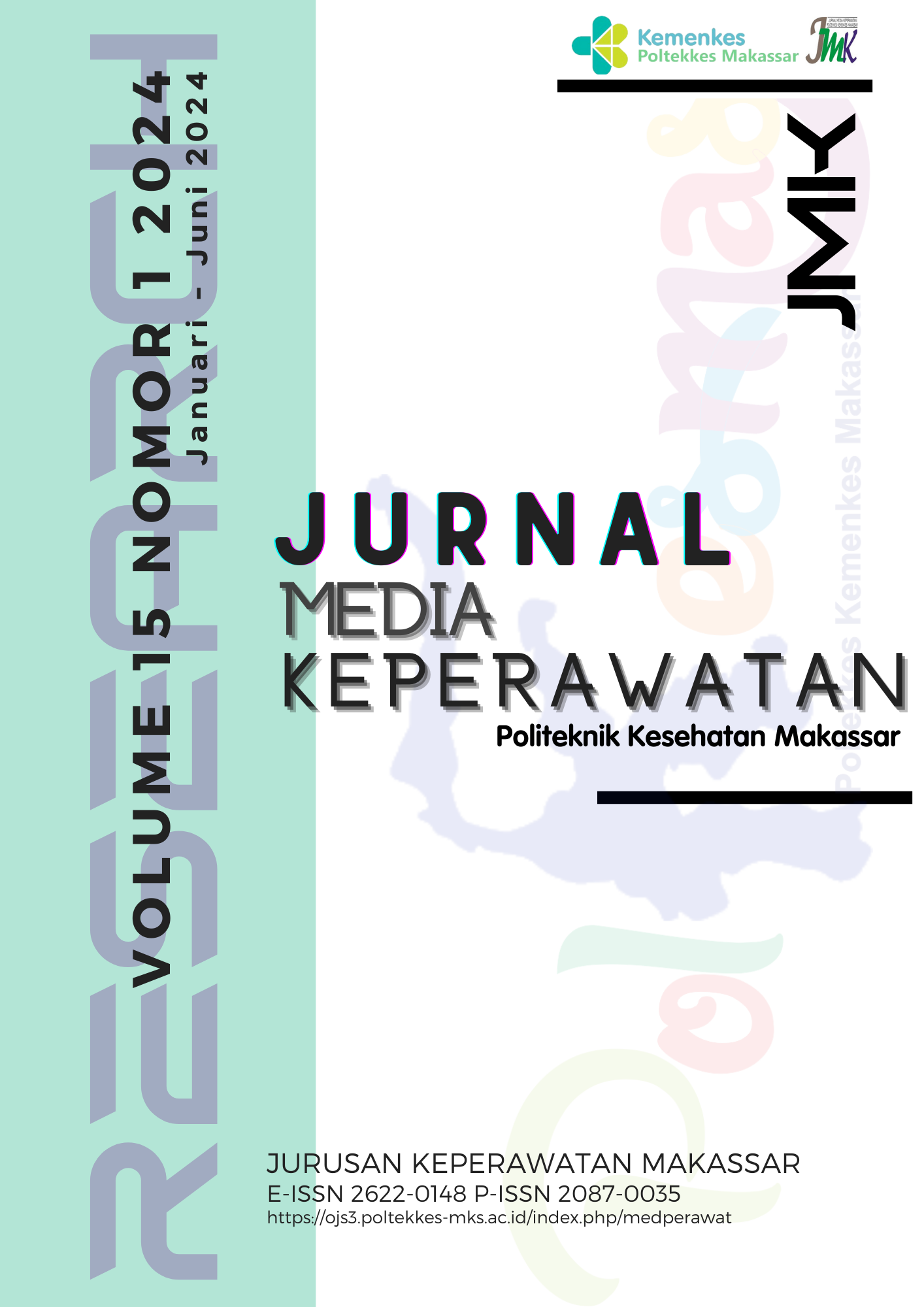HUBUNGAN SINDROM MENOPAUSE DENGAN KUALITAS HIDUP WANITA MENOPAUSE DI KOTA JAMBI
The relationship of menopause syndrome and the quality of life of menopause women in Jambi
Kata Kunci:
Sindrom Menopause, Wanita, Kualitas HidupAbstrak
Menopause is something that women experience, one third of a woman's life will experience menopause. Menopausal syndrome as symptoms during menopause appears in three domains, there are the psychological domain, the somatic-vegetative domain, and the urogenital domain. Complaints that are felt because of decrease in the hormone estrogen which affects other body functions can cause anxiety and affect the quality of life of menopausal women.This study aimed to determine the relationship between menopausal syndrome and quality of life for menopausal women at Jambi City. This research used quantitative research with a correlational type of research used a cross-sectional approach. The sampling technique used the accidental sampling approach to 100 menopausal women respondents at Jambi City. The results of the study were alnalized with the Kendall Tau correlation test. The results showed that there was a significant relationship between menopausal syndrome and the quality of life of postmenopausal women with a p-value of 0.001 and r 0.726 means having a significant relationship between variables.This research showed that there is a significant relationship between menopausal syndrome with the quality of life of menopausal women which shows a strong relationship. The results of research regarding menopausal syndrome and the quality of life of women with menopause in this study are expected to help explain the condition of women in non-reproductive conditions. The conditions experienced are certainly different during the productive period. Health service providers can take this information to provide optimal service to women.
ABSTRAK
Menopause merupakan suatu hal yang dialami oleh wanita, sepertiga dari kehidupan seorang wanita akan mengalami menopause. Sindrom menopause sebagai gejala pada masa menopause muncul dalam tiga domain, yaitu domain psikologis, domain somatik-vegetatif, dan domain urogenital. Keluhan yang dirasakan karena adanya penurunan hormon estrogen yang mempengaruhi fungsi tubuh lainnya dapat menimbulkan kecemasan dan mempengaruhi kualitas hidup wanita menopause. Penelitian ini bertujuan untuk mengetahui hubungan sindrom menopause dengan kualitas hidup wanita menopause di Kota Jambi. Penelitian ini menggunakan penelitian kuantitatif dengan jenis penelitian korelasional menggunakan pendekatan cross sectional. Teknik pengambilan sampel menggunakan pendekatan Accidental Sampling terhadap 100 responden wanita menopause di Kota Jambi. Hasil penelitian difinalisasi dengan uji korelasi Kendall Tau. Hasil penelitian menunjukkan terdapat hubungan yang signifikan antara sindrom menopause dengan kualitas hidup wanita pascamenopause dengan p-value sebesar 0,001 dan r 0,726 artinya terdapat hubungan yang signifikan antar variabel. Penelitian ini menunjukkan bahwa terdapat hubungan yang signifikan antara sindrom menopause dengan kualitas hidup wanita menopause yang menunjukkan adanya hubungan yang kuat. Hasil penelitian mengenai sindrom menopause dan kualitas hidup wanita menopause pada penelitian ini diharapkan dapat membantu menjelaskan kondisi wanita dalam kondisi non-reproduksi. Kondisi yang dialami tentu berbeda pada masa produktif. Penyedia layanan kesehatan dapat memanfaatkan informasi ini untuk memberikan pelayanan yang optimal kepada perempuan.
Referensi
ACOG. (2014). ACOG Practice Bulletin No. 141: management of menopausal symptoms. Obstetrics and Gynecology, 123(1), 202–216. https://doi.org/10.1097/01.AOG.0000441353.20693.78
Aninye, I. O., Laitner, M. H., & Chinnappan, S. (2021). Menopause preparedness: Perspectives for patient, provider, and policymaker consideration. Menopause, 28(10), 1186–1191. https://doi.org/10.1097/GME.0000000000001819
Badan Pusat Statistik Provinsi Jambi. Statistik Daerah Provinsi Jambi. Jambi: BPS Provinsi Jambi; 2022.
De Andrade, L. O. M., Filho, A. P., Solar, O., Rígoli, F., De Salazar, L. M., Serrate, P. C. F., Ribeiro, K. G., Koller, T. S., Cruz, F. N. B., & Atun, R. (2015). Social determinants of health, universal health coverage, and sustainable development: Case studies from Latin American countries. The Lancet, 385(9975), 1343–1351. https://doi.org/10.1016/S0140-6736(14)61494-X
Fenton, A., & Panay, N. (2014). Editorial: Menopause and the workplace. Climacteric, 17(4), 317–318. https://doi.org/10.3109/13697137.2014.932072
Hardy, C., Thorne, E., Griffiths, A., & Hunter, M. S. (2018). Work outcomes in midlife women: the impact of menopause, work stress and working environment. Women’s Midlife Health, 4(1), 1–8. https://doi.org/10.1186/s40695-018-0036-z
Lee, E., Anselmo, M., Tahsin, C. T., Vanden Noven, M., Stokes, W., Carter, J. R., & Keller-Ross, M. L. (2022). Vasomotor symptoms of menopause, autonomic dysfunction, and cardiovascular disease. American Journal of Physiology. Heart and Circulatory Physiology, 323(6), H1270–H1280. https://doi.org/10.1152/ajpheart.00477.2022
Lee, K. A., & Baker, F. C. (2018). Sleep and Women’s Health Across the Lifespan. Sleep Medicine Clinics, 13(3), xv–xvi. https://doi.org/10.1016/j.jsmc.2018.06.001
Nguyen, T. M., Do, T. T. T., Tran, T. N., & Kim, J. H. (2020). Exercise and quality of life in women with menopausal symptoms: A systematic review and meta-analysis of randomized controlled trials. International Journal of Environmental Research and Public Health, 17(19), 1–20. https://doi.org/10.3390/ijerph17197049
Rindner, L., Strömme, G., Nordeman, L., Hange, D., Gunnarsson, R., & Rembeck, G. (2017). Reducing menopausal symptoms for women during the menopause transition using group education in a primary health care setting—a randomized controlled trial. Maturitas, 98, 14–19. https://doi.org/10.1016/j.maturitas.2017.01.005
Smail, L., Jassim, G., & Shakil, A. (2019). Menopause-Specific Quality of Life among Emirati Women. International Journal of Environmental Research and Public Health, 17(1). https://doi.org/10.3390/ijerph17010040
Sulistyowati, I., & Susilawati, D. (2021). Hubungan Sindrom Menopause Dengan Kualitas Hidup Wanita Menopause Di Kelurahan Genuk Kabupaten Semarang. Jurnal Ilmu Keperawatan Maternitas, 4, 29–37. https://doi.org/10.32584/jikm.v4i2.1257
Woods, N. F., & Mitchell, E. S. (2016). The Seattle Midlife Women’s Health Study: a longitudinal prospective study of women during the menopausal transition and early postmenopause. Women’s Midlife Health, 2, 6. https://doi.org/10.1186/s40695-016-0019-x
Ye, L., Knox, B., & Hickey, M. (2022). Management of Menopause Symptoms and Quality of Life during the Menopause Transition. Endocrinology and Metabolism Clinics of North America, 51(4), 817–836. https://doi.org/10.1016/j.ecl.2022.04.006
Unduhan
Diterbitkan
Cara Mengutip
Terbitan
Bagian
PDF downloaded: 379


.jpg)
.jpg)
2.jpg)
2.jpg)
2.jpg)
_(1)1.jpg)
.jpg)
.png)
.png)
.png)
.png)
.png)
.png)
.png)
.png)
.png)
.png)
1.jpg)
2.jpg)
4.png)
.jpg)
1.jpg)
.png)
.png)
.jpg)
1.png)
.jpg)




